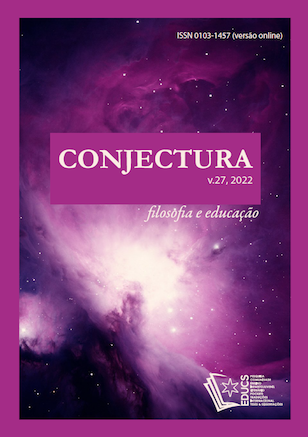The teaching of philosophy in basic education: possibilities of resistance
DOI:
https://doi.org/10.18226/21784612.v27.e022033Abstract
: This article addresses the situation of teaching philosophy in the historical context of Brazilian education. Through a bibliographical and documentary research, it is proposes to reflectively investigate the conditions that the teaching of philosophy has to (a) assert itself as a condition for the promotion of autonomous thinking in basic education, within the space reserved for it in the current Brazilian educational context , marked by neoliberal reforms, aimed at market interests. Based on the concept of philosophy as the creation of concepts, its main function in the classroom, among others, is to present itself as an environment free from the external demands established by official educational programs, in which students are able to develop autonomous thinking and build their subjectivity in a detached way. This assignment requires certain requirements such as the presence of philosophy as a discipline, teachers specialized in the area, and free time of sufficient quality to exercise autonomous thinking, which are mostly absent in the teaching model that is being implemented. In the current scenario, marked by reforms guided by neoliberal trends that submit education to the interests of the economy, the space for philosophy in basic education is reduced and threatened. Such changes reinforce the dualism present in Brazilian education, which assigns a general education to the privileged class and another of a labor nature to the female worker, preventing the implementation of an integral human education for all, in which philosophy plays a fundamental role. Finally, it is understood that, despite the unfavorable scenario, it remains for philosophy to create forms of resistance, inside and outside the school, in order to be able to assert itself.
Keywords: Teaching. Philosophy. Secondary Education Reform.
References
ALVES, D. J. A filosofia no ensino médio: ambiguidades e contradições na LDB. Campinas, SP: Autores Associados, 2002.
ARANHA, M. L. A.; MARTINS, M. H. P. Filosofando: Introdução à Filosofia. 4. ed. São Paulo: Moderna, 2009.
ASPIS, R. L.; GALLO, S. Ensinar filosofia: um livro para professores. São Paulo: Atta Mídia e Educação, 2009.
BRASIL. Lei nº 9.394 de 1996. Estabelece as diretrizes e bases da educação nacional. 1996. Disponível em: http://www.planalto.gov.br/ccivil_03/Leis/L9394.htm. Acesso em: 05 ago. 2021.
BRASIL. Projeto de Lei nº 3.178 de 1997. Inclui no currículo do ensino médio a filosofia e sociologia, como disciplinas obrigatórias. 1997a. Disponível em: https://www.camara.leg.br/proposicoesWeb/fichadetramitacao?idProposicao=19225. Acesso em: 30 jul. 2021.
BRASIL. Decreto nº 2.208 de 1997. Regulamenta o § 2 º do art. 36 e os arts. 39 a 42 da Lei nº 9.394, de 20 de dezembro de 1996, que estabelece as diretrizes e bases da educação nacional. 1997b. Disponível em: http://w.planalto.gov.br/ccivil_03/decreto/d2208.htm. Acesso em: 05 ago. 2021.
BRASIL. Lei nº 11.684, de 2 de junho de 2008. Altera o art. 36 da Lei no 9.394, de 20 de dezembro de 1996, que estabelece as diretrizes e bases da educação nacional, para incluir a Filosofia e a Sociologia como disciplinas obrigatórias nos currículos do ensino médio. 2008. Disponível em: http://www.planalto.gov.br/ccivil_03/_Ato2007-2010/2008/Lei/L11684.htm#art1. Acesso em: 31 jul. 2021.
BRASIL. Lei nº 13.415 de 2017. Altera as Leis n º 9.394, de 20 de dezembro de 1996, que estabelece as diretrizes e bases da educação nacional, e 11.494, de 20 de junho 2007, que regulamenta o Fundo de Manutenção e Desenvolvimento da Educação Básica e de Valorização dos Profissionais da Educação, a Consolidação das Leis do Trabalho - CLT, aprovada pelo Decreto-Lei nº 5.452, de 1º de maio de 1943, e o Decreto-Lei nº 236, de 28 de fevereiro de 1967; revoga a Lei nº 11.161, de 5 de agosto de 2005; e institui a Política de Fomento à Implementação de Escolas de Ensino Médio em Tempo Integral. 2017. Disponível em: http://www.planalto.gov.br/ccivil_03/_ato2015-2018/2017/lei/l13415.htm. Acesso em: 01 ago. 2021.
BRASIL. Base Nacional Comum Curricular. Brasília: MEC, SEB, 2018.
CARVALHO, A. F. O ensino de Filosofia e discernimento no mundo contemporâneo: questões atuais. Educação. v. 40, n. 1, p. 89-100, jan./abr. 2015.
CIAVATTA, M. A formação integrada: a escola e o trabalho como lugares de memória e de identidade. In: FRIGOTTO, G.; CIAVATTA, M.; RAMOS, M. (Orgs.). Ensino Médio integrado: concepções e contradições. São Paulo: Cortez, 2005.
DELEUZE, G. Conversações. São Paulo: Editora 34, 2017.
DELEUZE, G. Diferença e repetição. São Paulo: Paz e Terra, 2018.
DELEUZE, G.; GUATTARI, F. O que é a filosofia? São Paulo: Editora 34, 2004.
GALLO, S. Filosofia: experiência do pensamento. 2. ed. São Paulo: Scipione, 2016.
GALLO, S. Deleuze e a educação. Belo Horizonte: Autêntica, 2017a.
GALLO, S. O aprender em múltiplas dimensões. Perspectivas da Educação Matemática –INMA/UFMS. v. 10, n. 22, p. 103-114, 2017b.
GALLO, S. Metodologia do ensino de filosofia: Uma didática para o ensino médio. Campinas: Papirus, 2020. Edição do Kindle.
HAN, B. Sociedade do cansaço. 2. ed. Petrópolis: Vozes, 2017.
RAMOS, M. N. História e política da educação profissional. Curitiba: Instituto Federal do Paraná, 2014.
SAVIANI, D. Educação brasileira: estrutura e sistema. Campinas: Autores Associados, 2018. Edição do Kindle.
SILVA, T. T. A "nova" direita e as transformações na pedagogia da política e na política da pedagogia. In: GENTILI, P. A. A.; SILVA, T. T. Neoliberalismo, Qualidade Total e Educação: Visões Críticas. Petrópolis: Vozes, 1994.
SANTOS, J. V. Base Comum Curricular, um instrumento da biopolítica. Entrevistado: Sílvio Gallo. Revista do Instituto Humanitas Unisinos. v. XVII, n. 516, p. 37-41, dez. 2017.
STANDING, G. O precariado: a nova classe perigosa. Belo Horizonte: Autêntica, 2014.
Downloads
Published
How to Cite
Issue
Section
License
1. The publication of the originals will imply the assignment of copyright to Conjectura Journal.
2. Texts cannot be reproduced without authorization from the Journal after acceptance.









